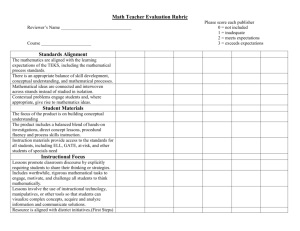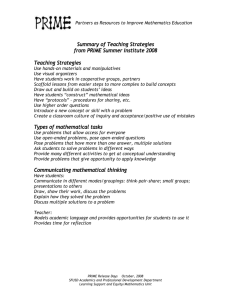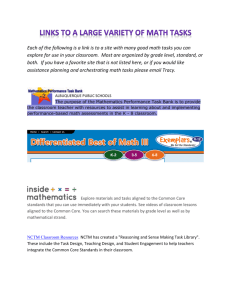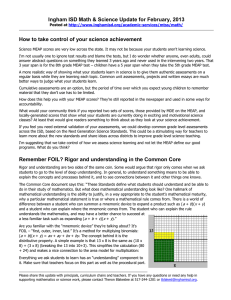Kansas Common Core State Standards * Talking Points
advertisement
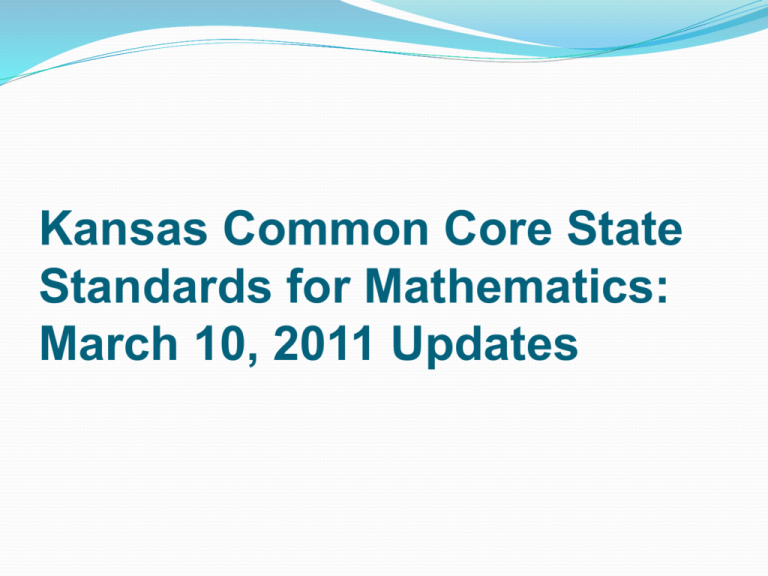
Kansas Common Core State Standards for Mathematics: March 10, 2011 Updates Student Benefits Student mobility—increased likelihood of comparable education across districts and states reduces obstacles to mobile students Increased alignment between K-12 and postsecondary narrows gap in college and career readiness District and State benefits New and better assessments that better measure student learning Student mobility—increased likelihood of comparable assessments between states allows for longitudinal data tracking Easier collaboration between states on curriculum and assessment Shifting of resources to focus on improving instructional practices When should schools begin to make the transition to Common Core State Standards? How to transition?....Some ideas Begin with the Mathematical Practices of CCS Mathematical Practices Rewards instructional best practices Clear vision of how students should approach and learn mathematics. Shifts focus to ensuring mathematical understanding over computation skills Mathematical Practices (the list) 1. 2. 3. 4. 5. 6. 7. 8. Make sense of problems and persevere in solving them. Reason abstractly and quantitatively. Construct viable arguments and critique the reasoning of others. Model with mathematics. Use appropriate tools strategically. Attend to precision. Look for and make use of structure. Look for and express regularity in repeated reasoning How to transition?....Some ideas Begin with the Mathematical Practices of CCS At some grades, there is really no reason to continue using 2003 Standards Kindergarten students in 2011-2012 will be in 3rd grade in 2014-2015 – They will never be tested on 2003 Standards 1st Grade students in 2011-2012 may never see a test based on 2003 Standards Look closely at the Critical Areas provided for each grade About Critical Areas Broad topics that can be used to organize instruction around for the entire year Closely aligned to NCTM’s Focal Points document Can be used as a focus for transition planning Sample Critical Areas In Grade 6, instructional time should focus on four critical areas: (1)connecting ratio and rate to whole number multiplication and division and using concepts of ratio and rate to solve problems; (2) completing understanding of division of fractions and extending the notion of number to the system of rational numbers, which includes negative numbers; (3) writing, interpreting, and using expressions and equations; and (4) developing understanding of statistical thinking. Suggested Alignment Tasks Focus on the Mathematical Practices 2. Implement the Critical Areas for each grade level 3. Identify 2003 tested indicators that are not covered by Critical Areas for supplementation (especially during 2011-2012 and 2012-2013 school years) 4. Look at the details in CCSS to ensure full curriculum alignment by 2014-2015 1. Contact Information David Barnes (dbarnes@ksde.org) Sid Cooley (scooley@ksde.org ) Tentative Assessment Changes for 2011-2012 School Year AYP Proficiency still based entirely on the 2003 Kansas Math Standards Some indicators (maximum 2 at any grade level) removed from the assessments Embedded items on all assessments that are aligned to the Kansas Common Core State Standards – Mathematics Critical Areas Tentative Assessment Changes (continued) Two types of reports: Proficiency report based only on items aligned to 2003 standards Performance report based on items that align to Common Core Critical Areas Three types of items on the assessment: Items based on 2003 Standards that count only for proficiency scores Items based on 2003 Standards that count for both proficiency and Common Core Critical Areas reports Embedded items that count only toward Common Core Critical Areas reports



